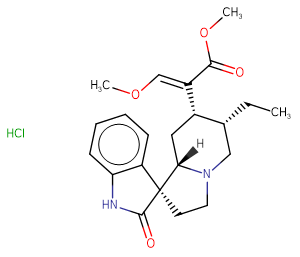
Corynoxine hydrochloride
CAS No. ——
Corynoxine hydrochloride( —— )
Catalog No. M19936 CAS No. ——
Corynoxine is a natural oxindole alkaloid and induces autophagy in different neuronal cell lines including N2a and SHSY-5Y cells.
Purity : >98% (HPLC)
 COA
COA
 Datasheet
Datasheet
 HNMR
HNMR
 HPLC
HPLC
 MSDS
MSDS
 Handing Instructions
Handing Instructions
| Size | Price / USD | Stock | Quantity |
| 2MG | 101 | Get Quote |


|
| 5MG | 140 | Get Quote |


|
| 10MG | 202 | Get Quote |


|
| 100MG | Get Quote | Get Quote |


|
| 200MG | Get Quote | Get Quote |


|
| 500MG | Get Quote | Get Quote |


|
| 1G | Get Quote | Get Quote |


|
Biological Information
-
Product NameCorynoxine hydrochloride
-
NoteResearch use only, not for human use.
-
Brief DescriptionCorynoxine is a natural oxindole alkaloid and induces autophagy in different neuronal cell lines including N2a and SHSY-5Y cells.
-
DescriptionCorynoxine is a natural oxindole alkaloid and induces autophagy in different neuronal cell lines including N2a and SHSY-5Y cells.
-
In Vitro——
-
In Vivo——
-
Synonyms——
-
PathwayAutophagy
-
TargetAutophagy
-
RecptorAutophagy
-
Research Area——
-
Indication——
Chemical Information
-
CAS Number——
-
Formula Weight420.93
-
Molecular FormulaC22H29ClN2O4
-
Purity>98% (HPLC)
-
SolubilityDMSO: 50 mg/mL;Ethanol: 50 mg/mL
-
SMILESCl.[H][C@@]12C[C@@H]([C@H](CC)CN1CC[C@@]21C(=O)Nc2ccccc12)C(=C/OC)\C(=O)OC
-
Chemical Name——
Shipping & Storage Information
-
Storage(-20℃)
-
ShippingWith Ice Pack
-
Stability≥ 2 years
Reference
1.Chen LL et al. Corynoxine a natural autophagy enhancer promotes the clearance of alpha-synuclein via Akt/mTOR pathway. J Neuroimmune Pharmacol. 2014 Jun;9(3):380-7.
molnova catalog



related products
-
SLLN-15
SLLN-15 (Autophagy inducer SLLN-15) is a potent, orally available inducer of autophagy that selectively activated cytostatic macroautophagy/autophagy in TNBC preclinical models.
-
Resveratrol analog 1
Resveratrol analog 1, an analog of Resveratrol, is a natural polyphenolic phytoalexin with antioxidant, anti-inflammatory, cardioprotective, and anti-cancer properties.
-
GC7 Sulfate
GC7 Sulfate is a potent inhibitor of deoxyhypusine synthase (DHS). Eukaryotic translation initiation factor 5A2 (eIF5A2) is the only known substrate for DHS, so GC7 inhibits the activation of eIF5A2 by inhibiting DHS activity.



 Cart
Cart
 sales@molnova.com
sales@molnova.com


